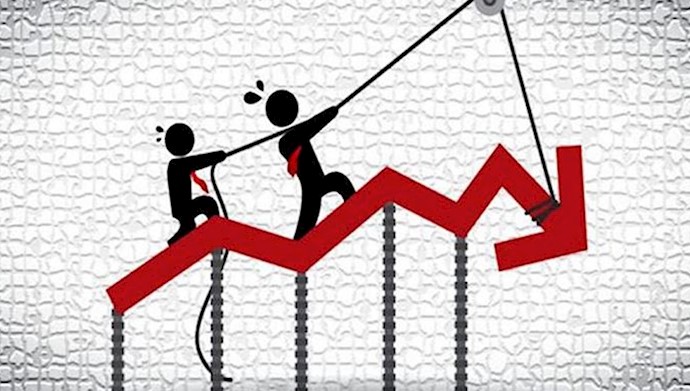Analysis by PMOI/MEK
April 1, 2019 – While the recent floods all over Iran and their devastating effects to the infrastructure and environment have uncovered parts of a decades-old campaign by the ruling mullahs to exploit and profiteer from natural resources without the slightest regard for the long-term consequences to the environment, opposing factions among the ruling elite, fearing the inevitable backlash by an increasingly discontent population, are blaming one another more than ever before for corruption and its consequences.
Meanwhile, growing international isolation, economic sanctions, and difficult strategic options that will be damaging to the regime one way or another, have fueled the already escalating infightings to unprecedented levels.
Masoud Pezeshkian, Iranian parliament’s first deputy speaker and close to regime president Hassan Rouhani’s faction, described the regime’s current impasse as graver than during the eight-year-long Iran-Iraq war and said: “During the new period of sanctions, Americans have become smarter and have increased the difficulties. In addition, there are financial and banking difficulties and there is a controversy inside the country about whether we should accept FATF or not.”
Addressing the escalating infightings among the ruling elite and its repercussions, Pezeshkian said: “Currently, we are continuously condemning each other about different issues, ignoring the fact that these condemnations are the very bomb that foreign forces have thrown into the regime’s field that has even injured some people.”
Mehdi Motaharnia, an Iranian political pundit close to the so-called reformist faction, warned about these crises saying: “Now the government is entering the Persian new year in such a situation. A year that will be very hot. Because, on the one hand, regional isolation and foreign forces’ efforts to undermine the Islamic Republic will increase, while on the other, economic difficulties have increased very much. Therefore, these [issues] can narrow and even block the path of the government.”
Hamid Mirmoiny, a technical analyst of the Iranian stock market, says: “The developments over the past year were not the prelude of better days for the manufacturing sector or the country’s economy in general. That’s why I say that past year, despite the liquidity that flowed into the capital market, we couldn’t benefit and [the liquidity] eventually left [the country] or was immobilized.”
“Therefore, since officials still haven’t presented a program for the market [with these conditions], we shouldn’t be very optimistic about its conditions for the Persian new year,” he added.
Iranian Diplomacy website, close to Rouhani’s faction, described the prospects for a political opening as gloomy and wrote: “At the end of a year full of ups and downs in Iran-Europe relations, where efforts to keep the JCPOA have been playing in the background, and while Iranian officials have reiterated that Europeans have not been ready to pay the necessary price to keep the JCPOA.”
The website then implicitly threatens Europe with its “security interests” and writes: “Now at the beginning of the Persian new year, it begs the question whether European countries will pay the necessary price of keeping the JCPOA and covering the security interests or not.”
Pedram Soltani, former deputy president of Iran’s Chamber of Commerce, writes: “The Persian new year started with a natural flood, but the bigger flood will be in our economy. Inflation will rise and economic growth will go under water. Liquidity pressure will throw the currency rate like driftwood on turbulent waters, ripping it from secure shores.”
Mocking the stagy measures of Iranian officials in hit areas, he adds: “But nobody will take selfies with this flood.”
Another controversy for the mullahs’ regime is the approval of the necessary laws to conform to FATF’s standards, the world’s de facto anti-money-laundering body. European countries have asked Iran to join the body in order to benefit from INSTEX, a so-called financial “special purpose vehicle” that is supposed to help the regime to sell its oil in exchange for food and drugs.
But considering Tehran’s ruling theocracy’s deep-rooted philosophy of sponsoring terrorist organizations around the world, dubbed as exporting the Islamic revolution, it’s hard to see a way for the mullahs out of the FATF dilemma without suffering game-changing causalities.
In his speech on the first day of the Persian New Year in Mashhad, Iranian regime supreme leader Ali Khamenei clearly showed the pessimistic prospects his Islamic Republic faces: “We should forgo the help and company of the West altogether. We shouldn’t wait for them. Because the West has shown that you can’t expect help from them. You can expect conspiracy from them, but you can’t depend on them at all. In this recent issue, the JCPOA, what were Europeans supposed to do? In Addition to not taking a stand in front of the U.S., while they continuously reiterated to us to not leave the JCPOA, they practically left it. This financial channel that recently it is continuously said that they have created a financial channel, this is more like a joke. A bitter joke indeed. In our latest international issue, Europeans have backstabbed us once again, cheated on us, you can’t expect anything from them.”





